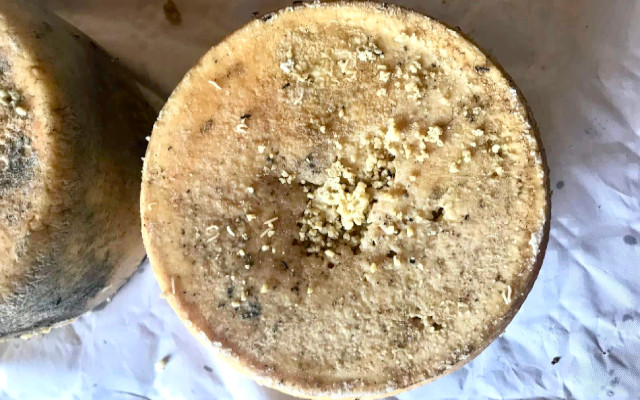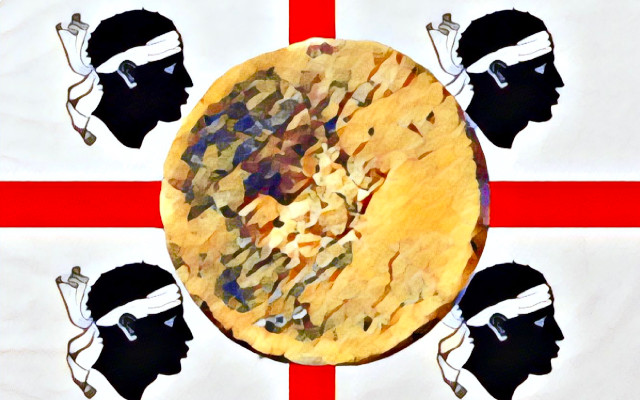– insects at the table have jumped to the news, thanks to new regulation on novel food. (1) But precisely in Italy – where the Ministry of Health has hired a prudential position towards ‘new foods’ – the ancient tradition of cheese with worms is rooted. Or rather, with the larvae. In Sardinia and beyond.
Casu marsu, an ancient Sardinian cheese
Il casu marsu, casu frazigu – cheese with worms, or moschetta – is registered in the list of Traditional Agricultural Products (PAT) of the Sardinia Region. (2) It is a typical product, prepared with raw sheep’s milk with ancestral dairy techniques, according to nature. The cheese is left to mature in an external environment, so that it can attract the dairy fly. (3)
La Piophila casei it penetrates the rind and lays the eggs from which many larvae are born, which activate a proteolytic decomposition / maturation process that gives the pasta a soft consistency. The internal maturation of the paste takes about 3 months, when the proteolytic action of the larvae reaches its peak. Production is seasonal, from late spring to late autumn, as it is closely linked to temperatures and microclimate. But the seasoning can continue, to increase the consistency of the casu.
 Photo by Francesca Cossu
Photo by Francesca Cossu
In Sardinia the casu marsu has always accompanied the family production of pecorino. Virtue of necessity, as the fly some years attacked more than half of the forms, as the old shepherds still remember. Pungent smell, strong aroma, very strong and spicy flavor. With smells and aromas that recall the aromatic essences of the Mediterranean scrub. The cheese is creamy inside and is spread on bread, where it best expresses its liveliness, also appreciated by foodies more hardened.
Cheeses with larvae, regional traditions in Italy
The peninsula on closer inspection it preserves various regional traditions of cheeses with larvae. Similar products to the casu marsu they are in fact:
the ‘marcetto’ or French hunts of Abruzzo,
the ‘gorgonzola coni grilli’ (where the allegorical reference to crickets represents the larvae moving in the cheese), in the Genoese hinterland,
the ‘salterello’ of Friuli,
il furmai nis (Nisso cheese) from Emilia,
il frmag point from Bari,
il casu du quagghiu Calabrian,
il caciè punt of Molise,
il bross ch’a march (walking cheese) from Piedmont,
il casu punctu of Salento.
10 out of 20 Italian regions they can therefore boast centuries of experience in the production and consumption of cheeses with larvae. L’entomophagy in this case it is not widespread (how much it is instead, eg, for the lumathan earth), since they are family productions mainly for domestic use. However, it is worth considering that the regulation ‘novel food’in such cases it does not operate, as it is possible to demonstrate a consumer experience prior to 1997. (4)
Dario Dongo and Alfonso Piscopo
Footnotes
(1) See reg. EU 2015/2283
(2) The register of Traditional Agri-food Products (PAT) was established by legislative decree 173/98, ‘Provisions on the containment of production costs and for the structural strengthening of agricultural enterprises (…) ‘. Some examples, with hints to the related discipline on https://www.foodagriculturerequirements.com/notizie/prodotti-agricoli-tradizionali-risponde-lavvocato-dario-dongo/. The caasu becciu, casu fattittu, casu marzu, hasu muhidu, rotten cheese is described in the Identification Sheet of the Traditional Products of the Sardinia Region, cheese area, on pages 12-13 of the document published on http://www.regione.sardegna.it/documenti/1_38_20160920145158.pdf
(3) The Sardinian breeders have asked the entomologists of the University of Sassari to create larvae of Piophila caseiin a sterile environment, to increase the level qualitative production,
(4) ‘Proof’ in the case of Sardinian cheese, against its registration in the register of Traditional Agricultural Products. The 18th revision of the national PAT register, updated at the beginning of 2018, is available on the MiPAAFT website https://www.politicheagricole.it/flex/cm/pages/ServeBLOB.php/L/IT/IDPagina/12327

Dario Dongo, lawyer and journalist, PhD in international food law, founder of WIISE (FARE – GIFT – Food Times) and Égalité.
Veterinary Director of the Provincial Health Authority of Agrigento and member of the scientific committee ‘Eurocarni’, he is the author and co-author of hundreds of scientific and non-scientific articles in national and international journals.


Dining and Cooking